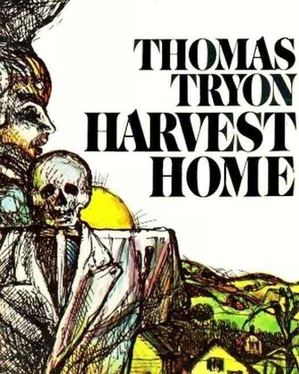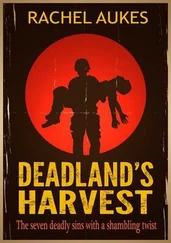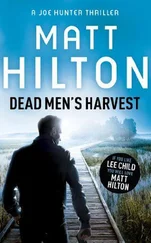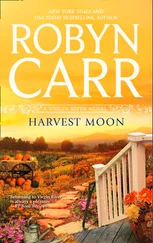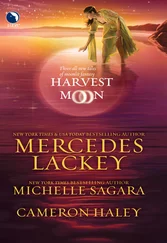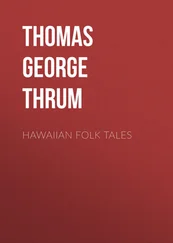Thomas Tryon - Harvest Home
Здесь есть возможность читать онлайн «Thomas Tryon - Harvest Home» весь текст электронной книги совершенно бесплатно (целиком полную версию без сокращений). В некоторых случаях можно слушать аудио, скачать через торрент в формате fb2 и присутствует краткое содержание. Жанр: Ужасы и Мистика, на английском языке. Описание произведения, (предисловие) а так же отзывы посетителей доступны на портале библиотеки ЛибКат.
- Название:Harvest Home
- Автор:
- Жанр:
- Год:неизвестен
- ISBN:нет данных
- Рейтинг книги:5 / 5. Голосов: 1
-
Избранное:Добавить в избранное
- Отзывы:
-
Ваша оценка:
- 100
- 1
- 2
- 3
- 4
- 5
Harvest Home: краткое содержание, описание и аннотация
Предлагаем к чтению аннотацию, описание, краткое содержание или предисловие (зависит от того, что написал сам автор книги «Harvest Home»). Если вы не нашли необходимую информацию о книге — напишите в комментариях, мы постараемся отыскать её.
For Ned and his family, Cornwall Coombe was to be come a place of ultimate horror.
Harvest Home — читать онлайн бесплатно полную книгу (весь текст) целиком
Ниже представлен текст книги, разбитый по страницам. Система сохранения места последней прочитанной страницы, позволяет с удобством читать онлайн бесплатно книгу «Harvest Home», без необходимости каждый раз заново искать на чём Вы остановились. Поставьте закладку, и сможете в любой момент перейти на страницу, на которой закончили чтение.
Интервал:
Закладка:
“How was the Harvest Lord chosen before Missy’s time?” I asked.
Mrs. Zalmon explained. “It was done by vote of the ladies. Everyone met in the church the afternoon of Agnes Fair and dropped a ballot in the collection box.” Then, Mrs. Green continued, the most votes won. But when Missy came along and it was discovered she had the power, it was decided this year to give up the voting and let her make the choice.
“Still and all,” Mrs. Zalmon put in, “that’s not to say Missy done the best, choosin’ Worthy.”
“What will happen if he isn’t in the play?” I asked.
“Not in the play?” The Widow gave a sharp look. “He’ll be in the play, will he, nill he. People expect it of him.”
“People don’t always do what people expect of them,” I ventured. “Maybe he’s got other plans.”
Mrs. Green sniffed. “He can’t have other plans. Boys must do their duty, same as men. That’s the way it’s always been. Isn’t that so?”
“Maybe.” The Widow was thoughtful. “Clem always thought so. But then he was a most unusual man.”
“Clemmon’s gone to glory,” Mrs. Zalmon said. The Widow nodded, and bit the end of her thread off.
“Aye, gone to glory,” she repeated softly. “Where, God willin’, I’ll follow afore long.”
“Afore long? Never think it, Widow!” exclaimed Mrs. Green.
“One day soon I’ll be gone.” She sighed. “Then who’ll there be to pass it all on? Who’ll there be to tell the young? Young folks is so diff’rent today than when we was girls. Still, there’s Tamar-”
“Pshaw, Tamar.” Mrs. Zalmon was indignant. “Tamar take your place?”
“Tamar’s hoydenish, no doubt,” the old lady said mildly, “but she’s got character and strength. She’s of the earth, Tamar is. Maybe she’s not so spiritual as we might hope for, but she’s apt. If a pusson could talk to her-bring her ‘round, so to speak-”
“She’d be a sight better than the bad one,” Mrs. Green agreed.
“Who was Grace Everdeen?” I suddenly asked.
The Widow looked up blankly. “Who was Grace Everdeen?” she repeated, looking not at me but at some invisible point between us. She thought for several moments. “Why, Grace Everdeen was old Bess Everdeen’s girl. Gracie Everdeen.” She repeated the name slowly, as though she had neither spoken nor heard it in a long time. Mrs. Zalmon frowned behind her glasses. I knew I hadn’t chosen a pleasant topic, but still I pursued it.
“But who was she? Why did she run away?”
“She was a wicked girl,” Mrs. Zalmon said firmly.
“The local Jezebel?” I remembered the comments after Mr. Buxley’s Sunday sermon about the jade of Samaria.
“In the Biblical sense.” Mrs. Zalmon’s needle paused in the air. “Grace was worse than any Jezebel. You could see the evil workin’ in her. Look how she changed. Took all those foolish notions, carried on as she did, shimmyin’ up the flagpole.”
“And if that wa’n’t bad enough,” Mrs. Green put in.
“Ayuh. Rasslin’ Roger to the ground at Agnes Fair.”
“In front of the whole village, mind you,” Mrs. Green said indignantly. “Shamin’ the Harvest Lord. Oh, she’d changed all right.”
“I could see it in her face. I could see the badness eatin’ at her. I knew she was lost long before the rest did. I saw her face all pinchin’ up, saw her eyes changin’. Look what come about the night of Harvest Home.”
“What happened then?” I asked.
“Mrs. Zee…” the Widow cautioned.
“She was a disruptive influence. At her worst she come, and-”
“Goodnight nurse, Mrs. Zee…!”
“Was a disruptive influence!”
From the village we heard the sound of bells. All talk and activity among the women stopped suddenly. Mrs. Green looked at the Tiffany clock on the shelf. “That’s not the six o’clock ringin’-”
The Widow laid aside her quilting. “It’s Mrs. Mayberry, passed over.”
Mrs. Zalmon glanced nervously at the fireplace. “Wind in the chimney. I knew it was an omen.”
The Widow removed her spectacles and pinched the bridge of her nose to ease it. “Aye. She’s passed, bless her heart. I done all I could, and Jim Buxley come to be there at the last. We must say a prayer tonight for her repose.”
Shaking their heads over the departed Mrs. Mayberry, the two other ladies said they’d better be going along. The Widow Fortune lingered for another cup of tea, and while Beth went to do something in the kitchen I took a sketch pad from my case and settled back in the club chair. On the small piecrust table beside it I kept a number of my bamboo pens, one of which I took out and sharpened with my penknife. Uncapping a bottle of ink, I began sketching the old lady as she bent over her quilting. From the unconscious pursings of her mouth and the slight lift of her brows, I could tell she knew what I was doing.
“What sort o’ pen is that?” she asked after I had been working for some moments. I held it up for her, showing her the hollow bamboo tube. “The Japanese use them,” I explained.
“Wily folk, the Japanese.” She glanced at my drawing hand. “How’s your wart?”
“About gone.” I produced the little red bag from inside my shirt and dangled it. “Wily folk, the New Englanders.”
“Here, put that away. Don’t go showin’ it to the neighbors.”
I dropped the bag back inside my shirt and we continued working, she on her sofa, I in my chair. When I had finished the sketch, the Widow asked to see it, and I held it up for her.
“Sakes,” she said, taking it and looking at it thoughtfully. “It’s to the life. The old lady and her sewin’.”
I tore off the page, rolled it up, and presented it to her. She accepted it with a nod and tucked it in her piece-bag. She took the bamboo pen from me and held it to the light, sighting through the hollow tube, then pressing the tip against her palm, as though in wonderment that a drawing could come from such an instrument. She patted my hand. “It’s the hand, of course, not the pen. It’s a tough row to hoe, art-en’t that so?”
“Art’s hard, they say.”
She lightly touched her fingers to my chest. “Art’s power, and it comes from there. In the heart.”
“Can I see you home?”
“No need. No tramp’s going to snatch an old lady. Not this old lady, anyways.” She called goodbye to Beth, then shouted up the stairs to Kate, who came to the top step and waved. While the Widow gathered up the rest of her things, I stifled a yawn. “Too much art. I’ve got to get to bed early.”
She had gone back in the bacchante room for her piece-bag, and as she returned, she paused, her hand resting briefly on the little wooden cask. Her expression was enigmatic as she crossed the hall, and I opened the front door for her. “But not too early to bed,” she said. She went down the steps and turned again, her glasses twinkling. She bobbed her head once, then went down the walk and turned up the lane.
I made a fire in the barbecue while Kate helped Beth carry out the dinner things. We were to dine on the terrace, on the wrought-iron glass-topped table that Beth was particularly fond of. We sat on the iron chairs with the white duck cushions, and there was the smell of autumn leaves in the air. While the steaks broiled we had the salad, and as Kate prattled on about her ambition to raise chickens I looked at Beth over the ironstone tureen. She wore her hair, as usual, in one long sweep, and she’d put on a touch of lipstick. I don’t know if it was merely the long late light, but she looked particularly beautiful. She had on blue jeans and a simple oxford button-down shirt, a marvelous shade of saffron, the color that monks wear in Tibet. I suddenly realized I had begun seeing her in a new light, that in some way she was undergoing subtle changes. She was still the chameleon, taking on the hues and attitudes of those around her, but a different quality had crept into her character, one of purpose and strong-mindedness. She seemed a more distinct personality, as if she were discovering things about herself. She seemed less my wife and more a woman in her own right, more self-reliant and independent. I felt I was looking at her in the round, so to speak, as one views a statue, from all sides, not merely a bas-relief with the figure partially imprisoned in the stone.
Читать дальшеИнтервал:
Закладка:
Похожие книги на «Harvest Home»
Представляем Вашему вниманию похожие книги на «Harvest Home» списком для выбора. Мы отобрали схожую по названию и смыслу литературу в надежде предоставить читателям больше вариантов отыскать новые, интересные, ещё непрочитанные произведения.
Обсуждение, отзывы о книге «Harvest Home» и просто собственные мнения читателей. Оставьте ваши комментарии, напишите, что Вы думаете о произведении, его смысле или главных героях. Укажите что конкретно понравилось, а что нет, и почему Вы так считаете.
